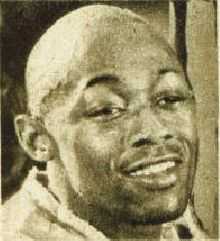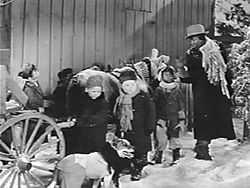Stepin Fetchit
| Stepin Fetchit | |
|---|---|
 | |
| Born |
Lincoln Theodore Monroe Andrew Perry May 30, 1902 Key West, Florida, U.S. |
| Died |
November 19, 1985 (aged 83) Woodland Hills, Los Angeles, California, U.S. |
Cause of death | Pneumonia and heart failure |
Resting place | Calvary Cemetery, East Los Angeles |
| Occupation | Actor |
| Years active | 1925–1976 |
| Spouse(s) |
Dorothy Stevenson (1929–?) Winifred Johnson Bernice Sims (?–1984) (her death) |
| Children |
Jemajo Perry (1930–) Donald Lambright (1938–1969) |
Lincoln Theodore Monroe Andrew Perry (May 30, 1902 – November 19, 1985), better known by the stage name Stepin Fetchit, was an American comedian and film actor.[1]
Perry parlayed the Fetchit persona into a successful film career, eventually becoming a millionaire, the first black actor in history to do so. He was the first black actor to receive featured screen credit in a film.[2][3]
Perry's typical film persona and stage name have long been controversial, and seen as illustrative of negative stereotypes of African-Americans. Seen through a modern lens, Perry's "laziest man in the world" character can be "painfully racist" but also "subversive".[4]
Early life
Little is certain about his background other than that he was born in Key West, Florida to West Indian immigrants.[2] He was the second child of Joseph Perry, a cigar maker from Jamaica (although some sources indicate the Bahamas) and Dora Monroe, a seamstress from Nassau. Both of his parents came to the United States in the 1890s, where they married. By 1910, the family had moved north to Tampa, Florida. Another source says he was adopted when he was eleven years old and taken to live in Montgomery, Alabama.[2]
His mother wanted him to be a dentist, so Perry was adopted by a quack dentist, where he blacked boots before running away at age twelve to join a carnival. He earned his living for a few years as a singer and tap dancer.[2]
Career
Perry began entertaining in his teens as a comic character actor. By the age of twenty, Perry had become a vaudeville artist and the manager of a traveling carnival show. His stage name was a contraction of "step and fetch it". His accounts of how he adopted the name varied, but generally he claimed that it originated when he performed a vaudeville act with a partner. Perry won money betting on a racehorse named "Step and Fetch It", and he and his partner decided to adopt the names "Step" and "Fetchit" for their act. When Perry became a solo act he combined the two names, which later became his professional name.[5]
Perry played comic relief roles in a number of films, all based on his character known as "The Laziest Man in the World". In his personal life, Perry was highly literate and had a concurrent career writing for the Chicago Defender.
Perry starred in Hearts in Dixie (1929), one of the first studio productions to boast a predominantly African-American cast.[6]
For his role as Joe in the 1929 part-talkie film version of Show Boat,[7] Perry's singing voice was supplied by Jules Bledsoe, who had originated the role in the stage musical. Fetchit did not "sing" "Ol' Man River", but instead a new song used in the film, "The Lonesome Road". Bledsoe was actually seen singing "Ol' Man River" in the sound prologue shown preceding the film.
Perry was good friends with fellow comic actor Will Rogers,[2] and they appeared in four films together, David Harum (1934), Judge Priest (1934), Steamboat 'Round the Bend (1935), and The County Chairman (1935).

Perry spawned imitators, most notably, Willie Best (Sleep 'n Eat) and Mantan Moreland, the scared, wide-eyed manservant of Charlie Chan. (Perry actually played a manservant in the Chan series before Moreland – in 1935's Charlie Chan in Egypt).[8]
Perry did not invent the stereotype with which his stage name became synonymous, but Stepin Fetchit's image was used to popularize it. Many black film characters were based on Stepin Fetchit, including Matthew Beard's "Stymie" in the Our Gang comedies. Perry had guest-starred in an earlier Our Gang short, A Tough Winter, intended as the pilot film for a Fetchit short subject series producer Hal Roach had planned, but which never materialized.
Fetchit appeared in 54 films between 1925 and 1976, and has a star on the Hollywood Walk of Fame in the category "Motion pictures".
Later life
While Perry was the first black actor to become a millionaire, he was forced to declare bankruptcy in 1947, stating assets of $146[2] (equal to about $1,526 today).[ 1]
Perry reportedly converted to Islam in the 1960s[2] and became a friend of heavyweight boxing champion Muhammad Ali.[2] Perry also found himself in conflict during his career with civil rights leaders who criticized him personally for the film roles he portrayed. Nonetheless, in 1976 the Hollywood chapter of the NAACP awarded him a Special NAACP Image Award. Two years after that, Perry was inducted into the Black Filmmakers Hall of Fame.
Personal life
Perry was married three times: to Dorothy Stevenson, Winifred Johnson, and Bernice Sims. In 1930 his wife Dorothy gave birth to their son, Jemajo.[3] With Winifred he had a second son in 1935: Donald, who later took his step-father's name, Lambright. In April 1969, Donald Lambright traveled the Pennsylvania Turnpike shooting people. He injured fifteen and killed three before turning the gun on himself.[9][10][11]
Death
A stroke in 1976[2] ended Perry's acting career, and he moved into the Motion Picture & Television Country House and Hospital.[2] He died November 19, 1985 from pneumonia and heart failure at age 83.[12] He was buried at Calvary Cemetery in East Los Angeles.[13]
Legacy
Fetchit's stage name was parodied by the late 1960s/early 1970s counterculture comedy duo The Congress of Wonders, portraying a young Russian lad named Stepney Fetchnik on their September 1970 comedy album Revolting. It was also spoofed on an episode of The Golden Girls, in which Rose Nylund (Betty White) tells a story about two dancers from her hometown of St. Olaf, Minnesota, Adolf Stepp and Olga Fetchik, who became "the internationally renowned Scandinavian dance team of Stepp 'n' Fetchik".
Filmography
|
|
|
See also
- Amos 'n' Andy
- Jar Jar Binks
- Blackface
- Buckwheat, a character played by Billie Thomas in the 1930s U.S. short film series Our Gang
- Billy Kersands
- "Old Aunt Jemima"
- Pickaninny
- Fred Toones
- Uncle Tom
References
- ↑ "Stepin Fetchit". New York Times. 2007-01-18. Retrieved 2011-10-14.
- ↑ 2.0 2.1 2.2 2.3 2.4 2.5 2.6 2.7 2.8 2.9 Lamparski, Richard (1982). Whatever Became Of ...? Eighth Series. New York: Crown Publishers. pp. 106–7. ISBN 0-517-54855-0.
- ↑ 3.0 3.1 Clark, Champ (2005). Shuffling to Ignominy: The Tragedy of Stepin Fetchit. iUniverse. p. 2. ISBN 0-595-37125-6.
- ↑ Roy Hurst (March 6, 2006). "Stepin Fetchit, Hollywood's First Black Film Star". National Public Radio. Retrieved 2007-07-30.
- ↑ Watkins, Mel (2005). Stepin Fetchit: The Life and Times of Lincoln Perry. Pantheon Books. pp. 32–33. ISBN 0-375-42382-6.
- ↑ Hall, Mordaunt (1929-02-28). "Hearts in Dixie (1929)". New York Times. Retrieved 2011-10-14.
- ↑ Hall, Mordaunt (1929-04-18). "Showboat (1929)". New York Times. Retrieved 2011-10-14.
- ↑ Sennwald, Andre (1935-06-24). "Charlie Chan in Egypt (1935)". New York Times. Retrieved 2011-10-14.
- ↑ Angry Young Man, The New York Times (April 6, 1969)
- ↑ Pike killer felt violence only racial answer, Pittsburgh Post-Gazette (April 7, 1969)
- ↑ Pike killer not on drugs, Pittsburgh Post-Gazette (April 10, 1969)
- ↑ "Comedian Stepin Fetchit, 83". The Philadelphia Inquirer. November 20, 1985. p. C–19.
- ↑ "Mass to Be Said Friday for Actor Stepin Fetchit". The Los Angeles Times. November 21, 1985. p. A30. Retrieved 2013-05-04.
Sources
- Katz, Ephraim (1979). The Film Encyclopedia. Thomas Y. Crowell, New York. ISBN 0-690-01204-7.
- Watkins, Mel (2005). Stepin Fetchit: The Life and Times of Lincoln Perry. Pantheon Books. ISBN 0-375-42382-6.
External links
- Stepin Fetchit at the Internet Movie Database
- Stepin Fetchit at AllRovi
- Stepin Fetchit at Find a Grave
- Stepin Fetchit at Virtual History
|